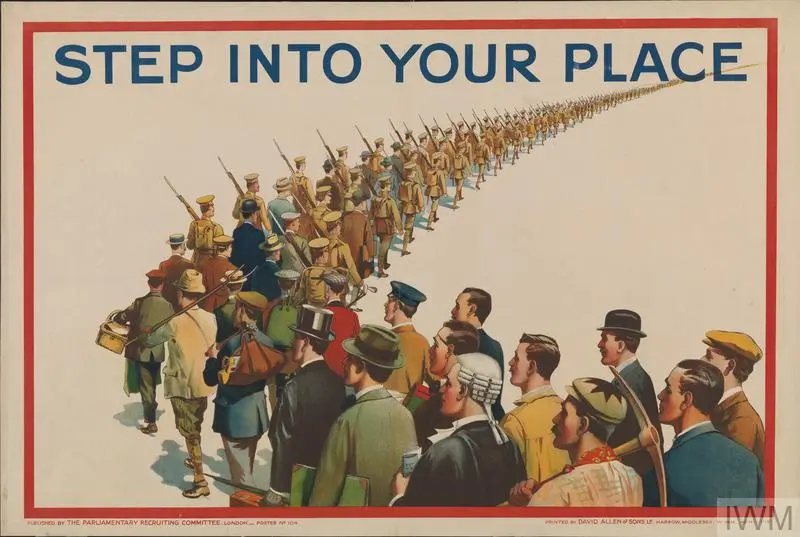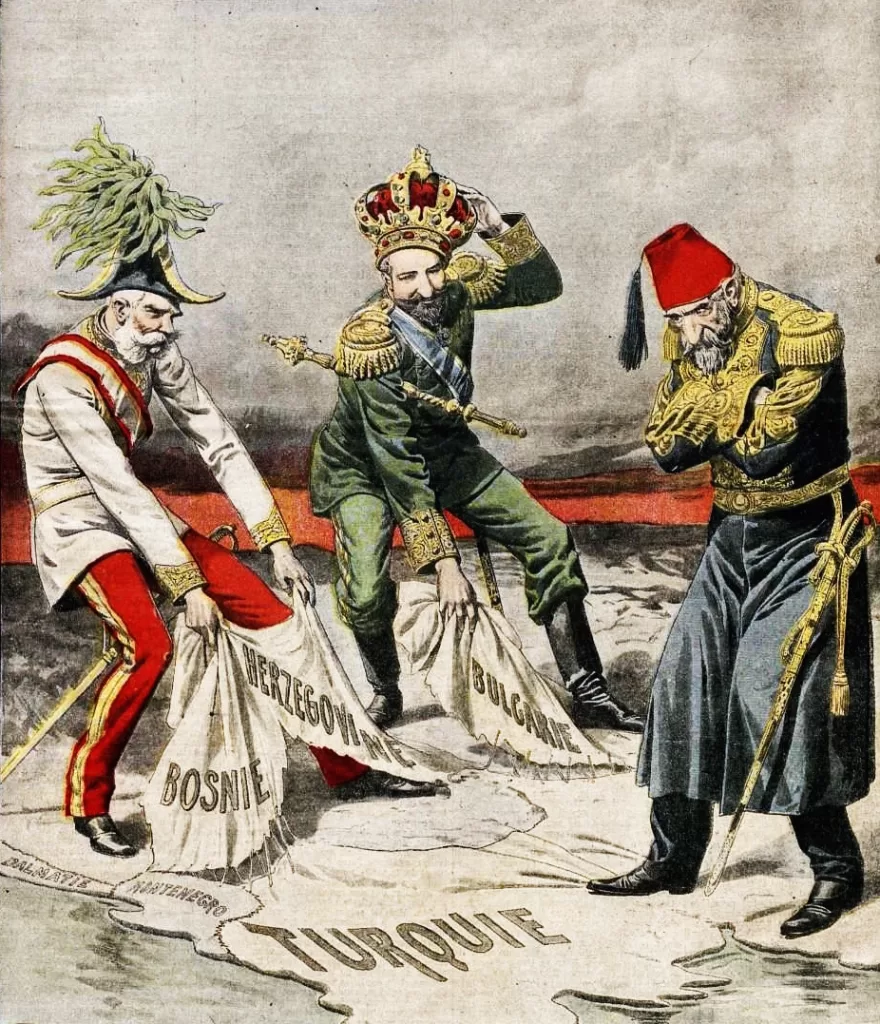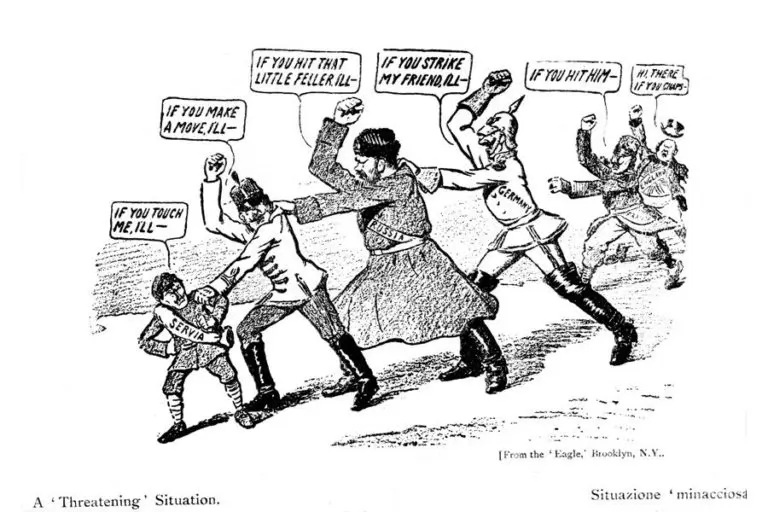First of all, what this article explores is not the trigger. You may already know that part. That’s the part where a certain radical gets a gun and shoots Archduke Franz Ferdinand and his wife, Sofia.
No. That’s like unknowingly lighting a match and having the whole room explode on you because there was a gas leak you didn’t know about.
What we’re really interested in is what caused the gas leak in the first place. In other words, we want to know what put a group of European empires on a collision course to the world’s first truly global war.
We want to know the causes of WWI.
And no, it wasn’t solely Germany’s fault.
The Preceding 100 Years
What is interesting about this war is that it was very much unexpected. Nobody in early 1914 expected a war was going to start merely a few months later. It is only with hindsight we can see the causes.
The preceding 100 years were as peaceful as it goes in Europe. The Europeans, as you might know, were once upon a time very fond of war. That might be hard to imagine now in a world where Europe has positioned itself as a beacon of peacefulness.

During this period there was the Crimean War, the German Wars of Unification, and the Italian Wars of Unification. That marks about 8 wars in total. That’s it, which isn’t too bad for a continent that’s literally had a war called the Hundred Years’ War in the past.
Setting the Scene
At this point in time, it was the Germans in the ascendency. They had recently been unified under the premiership of Otto von Bismarck and they were eager to prove themselves by competing with heavyweights such as Britain and France. And just like the others they wanted their own empire, and they wanted to increase their industrial output. But most importantly, they wanted to increase the size and power of their army and navy.
And this was what ultimately alarmed their neighbors the most, especially the French and British.
The French, you see, were recently routed and beaten by the Germans in the Franco-Prussian War of 1870. To add insult to injury, their own emperor was captured by the Germans in a battle along with the soldiers. So it was understandable that any expansion of German military strength induced fear and anger on their part.
The British were somewhat different. After they had defeated Napoleon in the Battle of Waterloo in 1815, they had become the global superpower. This superpower status was created through the might of the Royal Navy which policed the oceans and enforced British interests abroad. But the Germans saw that and decided they wanted their own piece of the pie. They wanted their own navy.
And the British didn’t like that.
Unsurprisingly this created an arms race. This is when two countries increase their military power to match and, hopefully, outstrip one another. But the issue with this is that it creates a situation so volatile that the deadlock can often only be broken with war.
Now the situation was bad enough, but it was about to get worse.
The Sides Begin to Form
France and Russia, being the two closest hostile countries to Germany, and therefore the most likely to be attacked first, sought to counter this by forming an alliance.
Feeling threatened and surrounded, the Germans joined with the Austro-Hungarians and the Italians in an alliance. The sides were beginning to form.
But there was one very important participant missing in this phase of alliance building. Britain.
Britain, seeing this, drifted closer to the former alliance with France and Russia, but didn’t go so far as to commit to an agreement.
You see, the British only wanted one thing, to maintain their superiority. For a very long time now, Britain had kept a policy of trying to keep a balance of power in Europe. No one nation was to be strong enough to dominate the continent and threaten Britain. But the tides were changing, and that tide was now favoring Germany.
Yet the British were still on the fence. They didn’t want to commit to an alliance against the Germans, yet they didn’t want German superiority either.
But soon a crisis would force their hand.
The Balkans
Now, let’s pause here and take a short trip to the Balkans.
At this period of time, the Balkans were a hotbed of nationalistic fervor and instability. Its former imperial master, the Ottomans, was going through a period of economic decline and was being preyed upon by its nearby European neighbors; earning the honor of being called the ‘sick man of Europe’ in the process.

Amidst its decline, parts of the Ottoman Empire were taken by the Austro-Hungarians, and other parts were claimed and controlled by the Kingdom of Serbia. At this time the Serbians were engaged in a conflict of their own with the Ottomans, seeking to retrieve Serb territories under their banner.
And it was in this environment a certain Black Hand society was formed involving a certain Gavrilo Princip. This secret society was formed with the aim of creating an independent Yugoslav nation. And presently, the Austrians were an obstacle to this with their control of Bosnia. In fact, Princip would later on say in his trial:
“I am a Yugoslav nationalist, aiming for the unification of all Yugoslavs, and I do not care what form of state, but it must be free from Austria.”
Anyway, on June 28th, 1914, in rolled in Archduke Franz Ferdinand and his wife Sophie, on a royal trip to Austrian-controlled Sarajevo. Next thing you know, one thing leads to another, and Princip has just killed the heir presumptive to the Austrian throne and his wife as well.
And that set off what’s called the July Crisis. This crisis was characterized by a series of diplomatic miscalculations which soon set off the First World War.
The July Crisis
Egged on by the Germans, the Austro-Hungarians laid an ultimatum consisting of draconian measures before Serbia. Whilst Serbia did make an effort, and actually met most demands, it was specifically designed so that they couldn’t.
Its sole aim was to serve as a pretext for war. The Austrians wanted war, and they were going to get it. And that’s exactly what happened, they declared war. But they had thoroughly miscalculated.
There was one problem with their plan.
A problem is the size of Russia.

It was a point of pride and national prestige to make sure a fellow Slavic nation didn’t succumb to their European rivals. And so they too joined the war, declaring war on Russia. Then the Germans joined in favor of the Austro-Hungarians, and the French joined to help Russia.
It happened as quickly as that. But there was still a large absence, Britain. The British were still on the fence about what they wanted to do. On the one hand, they had to stop potential German domination as a result of war, which might upset the balance of power in Europe.
But then again, another war in Europe wasn’t necessarily a bad thing as they might end up destroying one another. However, the Germans would soon help force their hand.
By this point, the British had entered into a promise with Belgium that if they were attacked, they would get help from the British. And the Germans, looking to crush the French quickly had created a plan, the Schieffelin plan to be exact, which involved the Germans attacking through Belgium to overwhelm the French.
Now when the British saw that plan coming to fruition, they had no choice but to come to the aid of the Belgians, the French, and the Russians against the Germans to avoid ridicule.
Ironically, this scenario would repeat itself two decades later in WWII when the Germans decided to attack Poland, thus forcing the British to declare war.
And so that’s how the continent ended up engulfed in the flames of war. But unlike every other war, this one would involve every country and their respective empires, which made it a world war. There was fighting everywhere, and it involved soldiers from regions as far-flung as India, Australia, and New Zealand.
So What Were the Causes of WWI?
Now, one might want to know who is to be blamed for this, and as we’ve alluded to earlier, it cannot be squarely placed on the doorstep of the Germans.
Firstly, nationalism played a large role. For a while now ideas about forging a nation based on a shared ethnic and national identity were sweeping across Europe. And Austria-Hungary, being a hotbed of ethnic tensions and rivalry, bore the brunt of that reality. The Ottomans had already failed to bring about order in the Balkans, and now they too were failing. This would most likely have ended in civil war had WWI not happened.
Secondly, if there was one mistake the Germans made above all others, it was the Schlieffen plan. Had they not made the mistake of forcing British involvement, they may well have won out. They made a similar mistake a few years later by getting the US to join against them in 1917 by sinking several merchant and passenger ships, especially the Lusitania in 1915.
Thirdly, the alliance networks certainly didn’t help with the situation. Each nation joined the war believing that they had another to back them up. This made them all reckless and forced a litany of diplomatic miscalculations.
And finally, the idealized vision of war as a glorious thing was another problem. From the fall of Napoleon in 1815 until 1914 there was an international order in effect called the Concert of Europe. And what this meant was that European countries for the most part shied away from war and opted to maintain the current political status quo. But by the end, there was a climate in the air of a relishing of war, and not just from the Germans, so that each nation could flex its military muscle.


